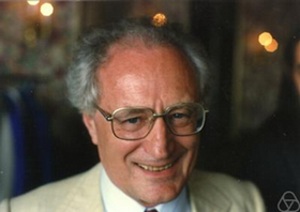
Hans-Joachim Bremermann
Professor of Mathematics and Molecular and Cellular Biology
Hans-Joachim Bremermann died in Berkeley of colon cancer on February 21, 1996, at the age of 69.
Born in Bremen, Germany, on September 14, 1926, he received the doctorate in mathematics from the University of Munster in 1951. After postdoctoral fellowships at Stanford with Stefen Bergmann in 1952, and at Harvard in 1953, he returned to Germany for a year. He then spent two years at the Institute for Advanced Study at Princeton, where he wrote a program for von Neumann's early computer MANIAC. This experience led to Bremermann's long-standing interest in computation and practical algorithms, and to a keen sense of their practical limitations. During the next year at the University of Washington, he published an agenda for the new field of artificial intelligence in a monograph sponsored by the Office of Naval Research, The Evolution of Intelligence. He joined the mathematics department at Berkeley in 1959. Bremermann's dissertation and many later papers were in the field of several complex variables. An outstanding contribution was his solution of the fundamental Levi problem. Subsequent papers made important contributions to plurisubharmonic functions, pseudoconvex domains, and holomorphy in infinite-dimensional domains. He also worked on applications of complex analysis to mathematical physics.
In Berkeley, Bremermann became a pioneer in the then nascent field that now encompasses artificial intelligence, computational complexity, neural networks, and genetic algorithms. He took over a seminar on self-organizing systems and continued it for thirty-two years, began computer simulations of evolution, and collaborated with the Bledsoe Research Group in Palo Alto on artificial intelligence. An influential outcome of this work is now known as the “Bremermann Limit” on the computational capacity of the matter in the universe. In 1970 he developed a global optimization algorithm, now called the “Bremermann Optimizer,” which was both inspired by, and applied to, biochemistry. He developed new algorithms for pattern recognition. He also explored the selective forces at work in evolutionary biology and population genetics, with an evident appreciation for the importance of a molecular approach to population genetics. Several of his papers investigated the evolutionary significance of sexual recombination. This led to fifteen years of mathematical studies of parasitism and disease, including pathogenic strategies, host-parasite interactions, virally induced cancers, catastrophes in crop cultivation, and the epidemiology and pathogenesis of disease. His last papers were provocative analyses of HIV pathogenesis.
Although he eventually became a full time member of what was then the Department of Biophysics and is now the Department of Molecular and Cellular Biology, his breadth of interests required that he continue his appointment in mathematics. His early presence as the first fulltime theoretician in biophysics provided an essential anchor and the glue which held together the varied programs and interests of quite a number of faculty colleagues who were engaged in part-time theoretical activities. His office door was always open. He or she who entered was easily engaged by his warmth and drawn into stimulating and wide-ranging discussions.
Bremermann's graduate courses, which covered an extraordinary range of topics, attracted students from many different departments and programs on campus. He nurtured more than 25 students through their Ph.D.'s. The dissertations of these students include work in complex analysis, set theory, formal logic, pattern recognition, applications of fuzzy-set theory and geometric topology to pattern recognition, knowledge representation, computer vision, neural networks, and theoretical biochemistry. Several of these doctoral projects were jointly supervised by other Berkeley and Stanford faculty members.
In 1995 Bremermann received a lifetime achievement award from the Evolutionary Programming Society for his contributions to the foundations of the field and for his work on genetic algorithms.
A man of vision, Bremermann was ahead of his time. The importance of his early work, especially in the realms of genetic computing and artificial intelligence, took a long time to achieve recognition. But he never expressed disappointment and never sought any material rewards.
His reward was the love and respect of his students and all those who knew him well.
Hans Bremermann is survived by his wife of forty-one years, the former Maribel Lopez Perez Ojeda.
Morris W. Hirsch
Thomas H. Jukes
Howard C. Mel
Lotfi A. Zadeh
